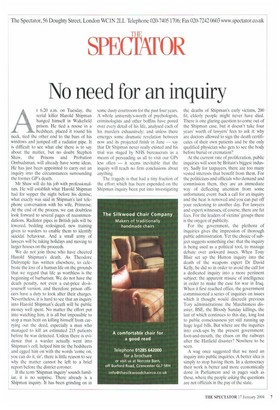o need for an inquiry
At 6.20 a.m. on Tuesday, the serial killer Harold Shipman hanged himself in Wakefield prison. He tied a noose in a bedsheet, placed it round his neck, tied the other end to the bars of his windows and jumped off a radiator pipe. It is difficult to see what else there is to say about the matter, but no doubt Stephen Shaw, the Prisons and Probation Ombudsman, will already have some ideas. He has just been appointed to carry out an inquiry into the circumstances surrounding the former GP's death.
Mr Shaw will do his job with professionalism. He will establish what Harold Shipman had for supper the night before his demise, what exactly was said in Shipman's last telephone conversation with his wife, Primrose. At the end of the process, we can doubtless look forward to several pages of recommendations. Radiator pipes in British jails will be lowered, bedding redesigned, new training given to warders to enable them to identify suicidal behaviour. And a small army of lawyers will be taking holidays and moving to larger houses on the proceeds.
We do not join those who have cheered Harold Shipman's death. As Theodore Dalrymple has written elsewhere, to celebrate the loss of a human life on the grounds that we regard that life as worthless is the beginning of barbarism. We do not have the death penalty, not even a cut-price do-ityourself version, and therefore prison officers have a duty to look after their charges. Nevertheless, it is hard to see that an inquiry into Harold Shipman's death will be public money well spent. No matter the effort put into watching him, it is all but impossible to stop a man bent on killing himself from carrying out the deed, especially a man who managed to kill an estimated 215 patients before he was detected. Unless there is evidence that a warder actually went into Shipman's cell, helped him tie the bedsheets and egged him on with the words 'come on, you can do it, sir', there is little reason to see why the matter cannot he left to a brief report before the district coroner.
If the term 'Shipman inquiry' sounds familiar, it is no surprise. There already is a Shipman inquiry. It has been grinding on in some dusty courtroom for the past four years. A whole university's-worth of psychologists, criminologists and other boffins have pored over every detail of his life, analysed each of his murders exhaustively; and unless there emerges some dramatic revelation between now and its projected finish in June — say that Dr Shipman never really existed and his trial was staged by NHS bureaucrats as a means of persuading us all to visit our GPs less often — it seems inevitable that the inquiry will reach no firm conclusions about anything.
The tragedy is that had a tiny fraction of the effort which has been expended on the Shipman inquiry been put into investigating the deaths of Shipman's early victims, 200 fit, elderly people might never have died. There is one glaring question to come out of the Shipman case, but it doesn't take four years' worth of lawyers' fees to ask it: why are doctors allowed to sign the death certificates of their own patients and be the only qualified physician who gets to see the body before burial or cremation?
At the current rate of proliferation, public inquiries will soon be Britain's biggest industry. Sadly for taxpayers, there are too many vested interests that benefit from them. For the politicians and officials who demand and commission them, they are an immediate way of deflecting attention from some unfortunate event: back a call for an inquiry and the heat is removed and you can put off your reckoning to another day. For lawyers and expert witnesses, of course, there are fat fees, For the leaders of victims' groups there is the oxygen of publicity.
For the government, the plethora of inquiries gives the impression of thorough public administration. Yet the choice of subject suggests something else: that the inquiry is being used as a political tool, to manage debate over awkward issues. When Tony Blair set up the Hutton inquiry into the death of the weapons expert Dr David Kelly, he did so in order to avoid the call for a dedicated inquiry into a more pertinent subject: the apparent misuse of intelligence in order to make the case for war in Iraq. When it first reached office, the government commissioned a series of inquiries on issues which it thought would discredit previous Tory administrations: the Marchioness disaster, BSE, the Bloody Sunday killings, the last of which continues to this day, long lost to public consciousness yet still running up huge legal bills. But where are the inquiries into cock-ups by the present government: foot-and-mouth, the chaos on the railways after the Hatfield disaster? Nowhere to be seen.
A wag once suggested that we need an inquiry into public inquiries. A better idea is simply to stop having them. In a democracy their work is better and more economically done in Parliament and in pages such as these, where the people asking the questions are not officials in the pay of the state.


































































 Previous page
Previous page